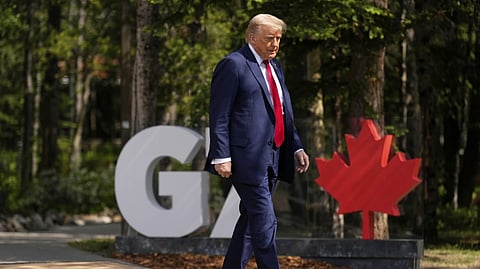

Donald Trump wants a 'real end' to the war, not a ceasefire, he says.
Is it a dire threat from the US President that he will be dropping the nuclear-bunker destroying bombs from the dreaded B-2 bombers on Iran?
Or is it high-stakes brinkmanship with an eye on getting the peace deal done or rather an Iranian sureender?
These are the questions floating around as the Israel-Iran war escalates and in a hugely worrying manner.
Interestingly, the development comes at a time when CNN is reporting that US intelligence believed that Iran was at least three years away from a nuclear bomb.
This revelation shoots Israel's rationale to initiate the attack to shreds. And also throws a big question mark over Trump's decision to let Netanyahu bomb Tehran.
Trump's latest statements from Air Force One came after he had warned people in Tehran to evacuate, once again inserting himself into a conflict he has no real part in.
In a post on Truth Social—now his official platform for presidential announcements—Trump had said, in his signature all caps, "IRAN CAN NOT HAVE A NUCLEAR WEAPON."
This is a phrase that leaps at you again and again if you scroll through his feed. Trump has posted "IRAN CAN NOT HAVE A NUCLEAR WEAPON" so many times that it reads like a mantra he is obsessed with.
Does he utter it in his sleep too? Or is it a Boy Scout promise he carries with him? You may be forgiven if you wonder.
In Monday's post, Trump had also underlined that "Iran should have signed the "deal" I told them to sign".
But the talk of negotiations has also never been far away for the "peace broker" who loves his time under the online sun and who had recently announced the India-Pakistan ceasefire and claimed credit for securing it.
"Yeah, we're trying," Trump had said earlier about the negotiations with Tehran.
"But sometimes you gotta do what you gotta do," he had, however, gone on to add then.
On Monday, Trump told The Wall Street Journal, "They (Iran) should have made a deal, and they still can, while there’s still something left."
At the G-7 summit, Trump had warned Tehran to rein in its nuclear programme before it is "too late". He claimed Iranian leaders were eager to talk but said they had already been given 60 days to reach an agreement and had failed to do so before Israel’s airstrikes began.
"They have to make a deal," he said.
When asked about the possibility of US military involvement, Trump dodged the question: "I don't want to talk about that."
Trump had made it clear he does not expect Israel to ease up on its military campaign against Iran.
"You're going to find out over the next two days. You're going to find out. Nobody’s slowed up so far," he had said cryptically.
Trump also mentioned the possibility of sending either US Middle East envoy Steve Witkoff or Vice President JD Vance to open lines of communication with Iran before quickly adding, "It depends what happens when I get back."
When asked if US intervention could destroy Iran's nuclear programme, Trump did not hold back. He said he hoped it would be "wiped out long before that".
Then came his sudden exit from G-7 summit after posing for a group photo with other leaders, with the comment: "I have to be back, very important."
French President Emmanuel Macron, who was also there, went on to claim that Trump was exploring the possibility of a ceasefire between Iran and Israel.
Soon, in classic Trump style, the US President jumped on Truth Social and Twitter to slam Macron as “publicity seeking” before adding that the French president had it all wrong.
The messaging changed when he reached the US and spoke from Air Force One before disembarking.
"We’re looking at better than a ceasefire. We're not looking for a ceasefire," Trump again reiterated. And then came the transformational line on Macron. The French President had changed into a "nice guy". The "but he doesn't get it right too often" remained.
With all this mixed messaging from Trump, the world continues to remain on tenterhooks for now.